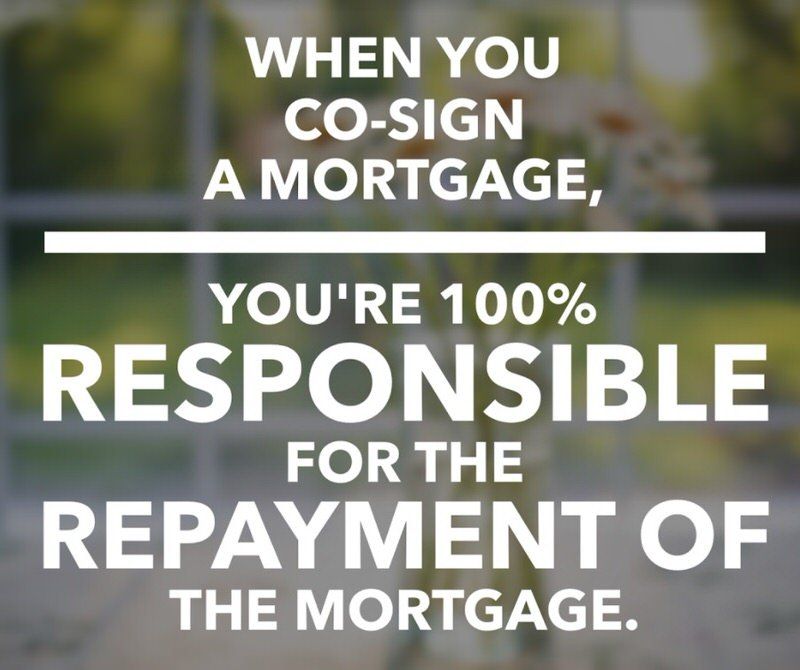5 Things You Need to Know Before You Co-Sign a Mortgage!
Joe Tomkins • February 17, 2021

So you're thinking about co-signing for a mortgage? Okay, do you really know what that means do you know what you are getting yourself into? Co-signing isn't necessarily a bad thing, but there is certainly a lot of misinformation floating around on the subject. Although it's nice to be in a position to help someone close to you qualify for a mortgage, It's not a decision that should be made lightly. Co-signing on a mortgage could have a significant impact on your future.
Here are some things you should consider before co-signing a mortgage application.
1. Regardless if you're the principal borrower, co-borrower, or co-signor, If you're on the mortgage, you're 100% responsible for the debt of the mortgage and everything that goes along with that. Although the term co-signor makes it sound like you are somehow removed from the actual mortgage, you have all the same legal obligations as everyone else on the mortgage.
2. If the person who you're co-signing for is unable to make the payments for any reason, you will be expected to make them on their behalf. By signing the mortgage documents, you assume full responsibility for the payments (even if it's not you making them).
3. If payments aren't being made, there is a chance the lender will take legal action against you. This includes all available collection methods such as obtaining a judgement in court or garnisheeing your wage or bank accounts. Worse case scenario, they could actually go after your property or assets in order to cover their loses. Now, this is highly unlikely, but not out of the realm of possibility.
4. Once the initial term has been completed, you will not automatically be removed from the mortgage. The person who you co-signed for will have to make a new application for the mortgage in their own name and qualify on their own merit. If they don't qualify at this time, you will be kept on the mortgage for the next term.
5. When you co-sign for a mortgage, all of the debt of the co-signed mortgage is counted against you. This means that if you're looking to buy another property in the future, you will have to include the payments of the co-signed mortgage in your debt service ratios, even though you're not the one making the payments. This could significantly impact the amount you can borrow in the future.
If you have any questions about co-signing on a mortgage, or about the mortgage application process in general, I'd love to discuss it with you. Please don't hesitate to contact me anytime!

Ready to Buy Your First Home? Here’s How to Know for Sure Buying your first home is exciting—but it’s also a major financial decision. So how can you tell if you’re truly ready to take that leap into homeownership? Whether you’re confident or still unsure, these four signs are solid indicators that you’re on the right path: 1. You’ve Got Your Down Payment and Closing Costs in Place To purchase a home in Canada, you’ll need at least 5% of the purchase price as a down payment. In addition, plan for around 1.5% to 2% of the home’s value to cover closing costs like legal fees, insurance, and adjustments. If you’ve managed to save this on your own, that’s a great sign of financial discipline. If you're receiving help from a family member through a gifted down payment , that works too—as long as the paperwork is in order. Either way, having these funds ready shows you’re prepared for the upfront costs of homeownership. 2. Your Credit Profile Tells a Good Story Lenders want to know how you manage debt. Before they approve you for a mortgage, they’ll review your credit history. What they typically like to see: At least two active credit accounts (trade lines) , like a credit card or loan Each with a minimum limit of $2,000 Open and active for at least 2 years Even if your credit isn’t perfect, don’t panic. There may still be options, such as using a co-signer or working on a credit improvement plan with a mortgage expert. 3. Your Income Can Support Homeownership—Comfortably A steady income is essential, but not all income is treated equally. If you’re full-time and past probation , you’re in a strong position. If you’re self-employed, on contract, or rely on variable income like tips or commissions, you’ll generally need a two-year history to qualify. A general rule: housing costs (mortgage, taxes, utilities) should stay under 35% of your gross monthly income . That leaves plenty of room for other living expenses, savings, and—yes—some fun too. 4. You’ve Talked to a Mortgage Professional Let’s be real—there’s a lot of info out there about buying a home. Google searches and TikToks can only take you so far. If you're serious about buying, speaking with a mortgage professional is the most effective next step. Why? Because you'll: Get pre-approved (and know what price range you're working with) Understand your loan options and the qualification process Build a game plan that suits your timeline and financial goals The Bottom Line: Being “ready” to buy a home isn’t just about how much you want it—it’s about being financially prepared, credit-ready, and backed by expert advice. If you’re thinking about homeownership, let’s chat. I’d love to help you understand your options, crunch the numbers, and build a plan that gets you confidently across the finish line—keys in hand.

How to Use Your Mortgage to Finance Home Renovations Home renovations can be exciting—but they can also be expensive. Whether you're upgrading your kitchen, finishing the basement, or tackling a much-needed repair, the cost of materials and labour adds up quickly. If you don’t have all the cash on hand, don’t worry. There are smart ways to use mortgage financing to fund your renovation plans without derailing your financial stability. Here are three mortgage-related strategies that can help: 1. Refinancing Your Mortgage If you're already a homeowner, one of the most straightforward ways to access funds for renovations is through a mortgage refinance. This involves breaking your current mortgage and replacing it with a new one that includes the amount you need for your renovations. Key benefits: You can access up to 80% of your home’s appraised value , assuming you qualify. It may be possible to lower your interest rate or reduce your monthly payments. Timing tip: If your mortgage is up for renewal soon, refinancing at that time can help you avoid prepayment penalties. Even mid-term refinancing could make financial sense, depending on your existing rate and your renovation goals. 2. Home Equity Line of Credit (HELOC) If you have significant equity in your home, a Home Equity Line of Credit (HELOC) can offer flexible funding for renovations. A HELOC is a revolving credit line secured against your home, typically at a lower interest rate than unsecured borrowing. Why consider a HELOC? You only pay interest on the amount you use. You can access funds as needed, which is ideal for staged or ongoing renovations. You maintain the terms of your existing mortgage if you don’t want to refinance. Unlike a traditional loan, a HELOC allows you to borrow, repay, and borrow again—similar to how a credit card works, but with much lower rates. 3. Purchase Plus Improvements Mortgage If you're in the market for a new home and find a property that needs some work, a "Purchase Plus Improvements" mortgage could be a great option. This allows you to include renovation costs in your initial mortgage. How it works: The renovation funds are advanced based on a quote and are held in trust until the work is complete. The renovations must add value to the property and meet lender requirements. This type of mortgage lets you start with a home that might be more affordable upfront and customize it to your taste—all while building equity from day one. Final Thoughts Your home is likely your biggest investment, and upgrading it wisely can enhance both your comfort and its value. Mortgage financing can be a powerful tool to fund renovations without tapping into high-interest debt. The right solution depends on your unique financial situation, goals, and timing. Let’s chat about your options, run the numbers, and create a plan that works for you. 📞 Ready to renovate? Connect anytime to get started!

Fixed vs. Variable Rate Mortgages: Which One Fits Your Life? Whether you’re buying your first home, refinancing your current mortgage, or approaching renewal, one big decision stands in your way: fixed or variable rate? It’s a question many homeowners wrestle with—and the right answer depends on your goals, lifestyle, and risk tolerance. Let’s break down the key differences so you can move forward with confidence. Fixed Rate: Stability & Predictability A fixed-rate mortgage offers one major advantage: peace of mind . Your interest rate stays the same for the entire term—usually five years—regardless of what happens in the broader economy. Pros: Your monthly payment never changes during the term. Ideal if you value budgeting certainty. Shields you from rate increases. Cons: Fixed rates are usually higher than variable rates at the outset. Penalties for breaking your mortgage early can be steep , thanks to something called the Interest Rate Differential (IRD) —a complex and often costly formula used by lenders. In fact, IRD penalties have been known to reach up to 4.5% of your mortgage balance in some cases. That’s a lot to pay if you need to move, refinance, or restructure your mortgage before the end of your term. Variable Rate: Flexibility & Potential Savings With a variable-rate mortgage , your interest rate moves with the market—specifically, it adjusts based on changes to the lender’s prime rate. For example, if your mortgage is set at Prime minus 0.50% and prime is 6.00% , your rate would be 5.50% . If prime increases or decreases, your mortgage rate will change too. Pros: Typically starts out lower than a fixed rate. Penalties are simpler and smaller —usually just three months’ interest (often 2–2.5 mortgage payments). Historically, many Canadians have paid less overall interest with a variable mortgage. Cons: Your payment could increase if rates rise. Not ideal if rate fluctuations keep you up at night. The Penalty Factor: Why It Matters More Than You Think One of the biggest surprises for homeowners is the cost of breaking a mortgage early —something nearly 6 out of 10 Canadians do before their term ends. Fixed Rate = Unpredictable, potentially high penalty (IRD) Variable Rate = Predictable, usually lower penalty (3 months’ interest) Even if you don’t plan to break your mortgage, life happens—career changes, family needs, or new opportunities could shift your path. So, Which One is Best? There’s no one-size-fits-all answer. A fixed rate might be perfect for someone who wants stable budgeting and plans to stay put for years. A variable rate might work better for someone who’s financially flexible and open to market changes—or who may need to exit their mortgage early. Ultimately, the best mortgage is the one that fits your goals and your reality —not just what the bank recommends. Let's Find the Right Fit Choosing between fixed and variable isn’t just about numbers—it’s about understanding your needs, your future plans, and how much financial flexibility you want. Let’s sit down and walk through your options together. I’ll help you make an informed, confident choice—no guesswork required.


